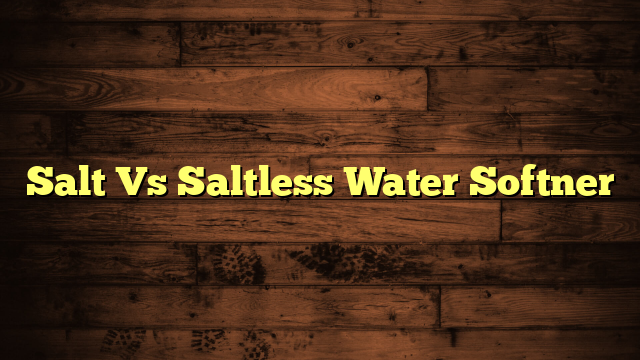Salt Vs Saltless Water Softner
When you're faced with the decision between salt and saltless water softeners, it's essential to weigh their unique benefits and drawbacks. Salt-based systems excel at removing hardness through ion exchange, but they come with maintenance demands and potential health implications due to added sodium. On the other hand, saltless options reduce hardness without the need for salt, which can lead to healthier water and lower upkeep. As you consider these factors, you'll find that the right choice might not be as straightforward as it seems. What will ultimately influence your decision?
Key Takeaways
- Salt water softeners effectively eliminate hard minerals, improving water quality and reducing scale buildup, but require regular salt maintenance.
- Saltless water softeners use technology to prevent scale without adding sodium, retaining beneficial minerals and requiring less maintenance.
- Salt-based systems can increase sodium in drinking water, potentially affecting health, while saltless options are more environmentally friendly.
- Initial costs for salt water softeners can be lower, but ongoing salt replenishment adds to long-term expenses compared to saltless systems.
- Consider household water quality needs, maintenance preferences, and environmental impact when choosing between salt and saltless water softeners.
Understanding Hard Water
When you notice that your soap isn't lathering well or your dishes have a cloudy film, you might be dealing with hard water. Hard water contains high levels of minerals, particularly calcium and magnesium, which can greatly influence your daily life.
One of the most noticeable hard water effects is the difficulty in achieving a good lather with soap. This can lead to using more product than necessary, ultimately raising your costs.
Additionally, hard water can leave unsightly deposits on your fixtures, appliances, and even your clothing. You might find your laundry looking dingy or your dishwasher struggling with residue build-up.
These issues stem from the water quality in your area, which can vary greatly depending on the source. If you're experiencing these problems, it's crucial to reflect on how hard water impacts not just your cleaning habits but also your appliances' lifespan.
Understanding hard water is the first step in addressing its effects. You should evaluate your home's water quality and think about solutions to mitigate the challenges it presents.
Making informed decisions about your water can lead to a more efficient, cleaner, and ultimately happier home environment.
How Salt Water Softeners Work
While you might be frustrated with hard water, salt water softeners offer an effective solution.
These systems use a process known as the salt regeneration process to combat the mineral buildup that hard water brings. Here's how it works:
- Ion Exchange: Water flows through a resin bed, where positively charged calcium and magnesium ions are replaced with sodium ions from the salt.
- Regeneration Cycle: After a certain amount of water has passed through, the system initiates the regeneration cycle, flushing the resin bed with a concentrated salt brine solution to restore its effectiveness.
- Brine Tank Maintenance: Regularly checking and refilling your brine tank is essential.
If it runs low, the softener won't function properly, and you could find yourself back at square one with hard water issues.
Benefits of Salt-Based Systems
When you choose a salt-based water softener, you're opting for a system that effectively removes hardness from your water, making it gentler on your skin and hair.
Not only does this method prove to be cost-effective in the long run, but it also helps extend the lifespan of your appliances by preventing mineral buildup.
You'll quickly notice the difference in both your water quality and the longevity of your household items.
Effective Hardness Removal
A salt-based water softener effectively tackles hard water problems by removing calcium and magnesium ions from your water supply. This process not only improves your water quality but also enhances the overall function and lifespan of your plumbing and appliances.
By employing effective hardness removal techniques, you can enjoy numerous benefits.
Here are three key advantages you'll appreciate:
- Better Skin and Hair: Soft water can leave your skin feeling smoother and your hair shinier, reducing the need for moisturizers and conditioners.
- Spotless Dishes: Say goodbye to those unsightly water spots on your dishes and glassware. Soft water keeps your dishes looking pristine.
- Longer-Lasting Appliances: With less mineral buildup, your appliances, such as water heaters and dishwashers, will run more efficiently and last longer.
Utilizing effective treatment methods, salt-based systems guarantee that your home enjoys consistent hardness removal.
Cost-Effective Operation
Investing in a salt-based water softener not only enhances your water quality but also offers a cost-effective operation that can greatly benefit your household budget. While initial installation costs might seem higher compared to saltless systems, the long-term savings can outweigh these expenses considerably.
Here's a quick breakdown of the financial aspects:
| Aspect | Salt-Based Systems |
|---|---|
| Installation Costs | Moderate |
| Maintenance Expenses | Low (salt replenishment only) |
Salt-based systems often require minimal maintenance, primarily involving salt replenishment, which is generally inexpensive. This low maintenance expense contributes to overall savings in the long run. Additionally, the efficiency of salt-based systems in removing hard minerals can lead to reduced wear and tear on your plumbing, appliances, and fixtures, ultimately saving you even more money on repairs and replacements.
Enhanced Appliance Longevity
Recognizing the benefits of salt-based water softeners can lead to enhanced appliance longevity in your home. By improving your water quality, these systems help reduce the wear and tear on your appliances, ultimately saving you money on repairs and replacements.
Here's how:
- Prevents Scale Buildup: Salt-based systems effectively remove minerals like calcium and magnesium that cause scaling. This means your appliances, like dishwashers and water heaters, will run more efficiently and last longer.
- Reduces Maintenance Costs: With improved water quality, you'll spend less on appliance maintenance. Fewer repairs mean more time and money saved for you.
- Enhances Efficiency: Softened water improves the efficiency of your appliances. They won't have to work as hard, which not only extends their lifespan but also lowers your energy bills.
Incorporating a salt-based water softener into your home can greatly improve your appliance longevity.
You'll enjoy cleaner dishes, softer laundry, and the peace of mind that comes from knowing your investment is protected.
Exploring Saltless Water Softeners
When you're considering water softeners, saltless systems offer a compelling alternative.
They use innovative technology to reduce hardness without the need for salt, providing benefits like easier maintenance and less environmental impact.
Let's explore how these systems work and what advantages they bring to your home.
Benefits of Saltless Systems
Saltless water softeners offer a range of benefits that make them an appealing choice for many households.
These systems not only help reduce hard water issues but also present a more sustainable option for your home.
Here are three key benefits you'll love:
- Lower Environmental Impact: By choosing a saltless system, you're minimizing the discharge of salt into the environment. This choice helps protect water sources and keeps ecosystems healthier.
- Reduced Maintenance Requirements: Unlike traditional salt-based systems, saltless water softeners require less upkeep. You won't need to constantly refill salt or worry about brine discharge, freeing up your time for more important tasks.
- Healthier Water for You and Your Family: Saltless systems treat hard water without removing essential minerals like calcium and magnesium. This means you'll enjoy water that's not only soft but also beneficial for your health.
Technology Behind Saltless Softeners
Utilizing advanced technology, saltless water softeners tackle hard water issues without the drawbacks of traditional systems. Instead of relying on salt, these innovative devices employ water ionization and various filtration methods to improve your water quality.
Water ionization works by altering the mineral composition of the water, effectively reducing the hardness caused by calcium and magnesium. This process doesn't remove these minerals but changes their structure, preventing them from causing scale buildup.
You'll notice that appliances, pipes, and fixtures remain cleaner for longer, which is a huge plus.
In addition, saltless systems utilize advanced filtration methods to further enhance water quality. These techniques can include activated carbon filters that reduce contaminants and improve taste, ensuring you get clean, invigorating water straight from the tap.
Pros and Cons Comparison
Deciding between a salt water softener and a saltless alternative often hinges on weighing their respective benefits and drawbacks.
Both options have their merits, but you need to reflect on how they align with your lifestyle and values.
Pros and Cons of Each:
- Salt Water Softeners:
- *Pros:* Effective in eliminating hard water minerals, leading to softer skin and cleaner appliances.
- *Cons:* Increased salt consumption effects can raise blood pressure and may harm septic systems.
- Saltless Water Softeners:
- *Pros:* Minimal environmental impact, as they don't discharge salt into the water supply, making them eco-friendly.
- *Cons:* While they reduce scale buildup, they may not be as effective in softening water as traditional systems.
- Overall Considerations:
- Think about your household's water quality needs and how much you're willing to invest in maintenance and environmental responsibility.
Cost Analysis of Both Options
When weighing the costs of salt water softeners versus saltless alternatives, you'll find significant differences that can impact your budget.
To begin with, the initial investment for salt water softeners typically ranges from $400 to $2,500, depending on the system's size and features. On the other hand, saltless systems generally require a smaller upfront payment, often between $1,000 and $2,000.
However, it's important to take into account ongoing costs in your cost comparison. Salt water softeners need regular salt replenishment, which can add up over time. Depending on your water hardness and usage, you might spend an additional $100 to $300 annually on salt.
In contrast, saltless systems usually have lower maintenance costs since they don't require salt and have fewer parts that wear out.
Ultimately, while the initial investment may seem lower for saltless options, the ongoing expenses of salt water softeners can make them more costly in the long run.
Making the Right Choice
Choosing between a salt water softener and a saltless alternative can feel overwhelming, especially after considering the cost implications.
To make the right choice, it's important to weigh not just the price but also the salt aesthetics and the environmental impact of each system. Here are three key points to help you decide:
- Water Quality: Salt water softeners are effective at removing hard minerals, resulting in softer water. However, they can leave behind salty residue that might affect taste and culinary uses.
- Maintenance: Salt-based systems often require regular maintenance and salt refills, while saltless options tend to be more straightforward, reducing your long-term workload.
- Environmental Considerations: Saltless systems generally have a lower environmental impact. They don't discharge excess sodium into water supplies, making them a more sustainable choice.
When you consider these factors, you'll be better equipped to choose the system that fits your lifestyle and values.
Frequently Asked Questions
Are Saltless Water Softeners Effective for All Types of Hard Water?
Saltless water softeners can be effective for various hard water types, but their efficiency may vary. You should consider the specific hardness levels in your water to determine if a saltless system meets your needs.
How Often Do I Need to Refill Salt in a Salt Water Softener?
You won't believe how essential salt refill frequency is! To keep your system running smoothly, check your maintenance schedule every month. Depending on usage, you might need to refill every few weeks or even sooner!
Can I Use Salt Water Softeners With Well Water?
Yes, you can use salt water softeners with well water, but ascertain the system's well water compatibility. Proper maintenance enhances softener efficiency, helping to effectively reduce hardness and improve water quality for your home.
Do Saltless Systems Require Electricity to Operate?
In the domain of saltless operation, you'll find these systems often dance around electricity needs. Generally, they require minimal power, ensuring efficient performance while keeping your energy bills pleasantly low. Enjoy softer water without the hassle!
Will Salt Water Softeners Harm My Plumbing Over Time?
Yes, salt water softeners can pose corrosion concerns for your plumbing over time. Regular plumbing maintenance is essential to mitigate damage, ensuring you protect your pipes and extend their lifespan while enjoying softened water benefits.
Conclusion
In the salt versus saltless showdown, your choice hinges on health, hassle, and harmony. Salt water softeners deliver dependable results but demand diligent upkeep and add sodium. Conversely, saltless systems simplify maintenance and support better water quality without the sodium scare. By weighing the pros and cons, considering costs, and reflecting on your lifestyle, you can confidently cultivate a customized solution that suits your needs. Ultimately, your water softening journey should promote purity and peace of mind.







